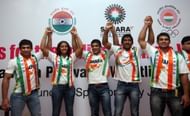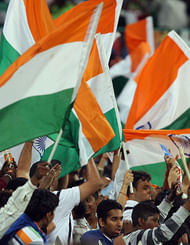With just a few days to go for the London Olympics, the hype over India’s medal chances at the games has reached a crescendo. A hype that’s being enjoyed by the general public and fuelled by the electronic, print and online media. But how realistic are our chances?
Let’s begin with a look at the National game where a section even of the mainstream press appears to be predicting a podium finish. Considering that India is currently ranked tenth in the world, have rarely beaten a top 5 team in the last ten years, and did not even qualify for the last Olympics, the expectations seem optimistic. This is not to disregard the progress the team has made in the last couple of years, but to reflect the ground reality. Even the Coach Michael Nobbs has stated that a top six finish would be commendable.
Although both Krishna Poonia and Vikas Gowda, who are being projected as medal certainties, have made great progress in the Women’s and Men’s Discus throw respectively , they will have to compete with at least 6 to 7 competitors who have better throws this season, so a medal, though not out of reach, is difficult. On the other hand, we have medal chances with Deepika Kumari in Archery, Mary Kom, Shiva Thapa and Vikas Krishan in Boxing, Sushil Kumar and Yogeshwar Dutt in Wrestling, Gagan Narang and Ronjan Sodhi in Shooting, and Saina Nehwal in Badminton, to name a few, but this is the Olympics and the competition is going to be fierce in every event.
There are quite a few firsts for us in this Olympics. Geeta Phogat is the first female wrestler to qualify for the Olympics; Amit Kumar is the youngest wrestler in the world to do so, Basant Bahadur Rana is the first ever Indian in the gruelling 50 km walk. This is our largest ever boxing contingent which includes the five-time world champion and mother of two, Mary Kom. For the first time in Badminton too we have qualified in four categories. If Poonia and Gowda make the Discus final, and they are likely to do so, they will be the first ever Indians in the final of an Athletics field event. Humble Army Jawans will be rowing alongside the water bred Etonians. Walkers, till recently without the money to buy shoes, will be competing with the best in the business. And it may be thanks to an 18 year old archer from Ranchi, with the most modest beginnings, that we might just hear the National Anthem played at the hallowed precincts of Lord’s Cricket Ground.
It is pertinent to note that all 81 of our athletes have qualified for the Olympics through a long and winding qualification process which in cases like Boxing is tougher than the Olympics itself. The qualification process is based on achieving prescribed standards, which in themselves are tough to attain. We must remember that a total of 204 countries will participate in the London Olympics and for each one of them the Olympic Games are the standard of excellence. Some of them like the USA, Germany, and Spain etc. have sporting DNA, some like the Caribbean sprinters and African middle distancers have sporting legacies, while others like China have structured programmes, all of whom churn out champions by the dozen. They all live, eat and breathe the Olympic creed of Citius Altius Fortius. And so, it is no mean feat to be amongst them. All of this has been made possible due to years of hard work, training and help from non-profit bodies like the Olympic Gold Quest, and in spite of huge constraints of lack of infrastructure, equipment, quality coaches and sponsorship.
This brings us to the perceptions of the Indian sports fan, which I am afraid lie in the bouquets or brickbats mindset. Even in a cricket obsessed nation the men in blue are either heroes or zeroes. In the event of our unrealistic expectations not materialising, this very hype surrounding our Olympians could soon turn into an ugly remonstration where the common refrain would be “ inko bhejte kyon hai yaar”. We are result merchants obsessed with quantity and rarely recognise quality. In addition, we equate these performances with National pride or shame with a liberal dose of sporting machismo. Perhaps we do not understand the Olympic spirit or the implications of the Games which are best exemplified In the words of Pierre de Coubertin, founder of the modern games, “The most important thing in the Olympic Games is not to win but to take part, just as the most important thing in life is not the triumph but the struggle. The essential thing is not to have conquered but to have fought well.”
What is required is a measured response. Besides supporting one’s team, a sports lover must be able to understand the game, appreciate the skills and applaud the opponents when they play well. The standing ovation given to Roger Federer in Andy Murray’s backyard at Wimbledon, after the latter’s defeat, is the benchmark for a mature sports audience. The real story is not how many medals we win at London, but that we have come this far! Whether our Olympians set the Thames on fire or not, for me, each one of them is a hero.


